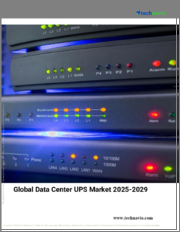
|
시장보고서
상품코드
1846036
데이터센터 UPS 시장 : 제품 유형별, 용도별, 최종사용자별, 지역별 범위 및 예측Global Data Center UPS Market By Product Type, By Application, By End User, By Geographic Scope and Forecast |
||||||
데이터센터 UPS 시장 규모와 예측
데이터센터 UPS 시장 규모는 2024년에 39억 5,000만 달러로 평가되었으며, 2024년부터 2031년까지 CAGR 4.00%로 성장하여 2031년에는 51억 4,000만 달러에 달할 것으로 예측됩니다.
데이터센터 UPS는 백업 전력을 공급하고 전력 장애로부터 데이터센터를 보호하기 위해 설계된 중요한 시스템으로, 정전이나 전력 변동 시 지속적인 운영을 보장합니다. 가동 시간 유지, 데이터 손실 방지, 전력 서지로부터 정밀 기기 보호에 중요한 역할을 합니다.
데이터센터 UPS는 고가용성과 비즈니스 연속성을 지원하기 위해 IT, 통신, 금융, 헬스케어 등의 산업에서 널리 사용되고 있습니다.
데이터센터 UPS의 미래는 디지털 인프라와 클라우드 컴퓨팅에 대한 의존도가 높아짐에 따라 보다 효율적이고 확장 가능하며 지속가능한 UPS에 대한 수요가 증가하고, 기술의 발전과 학습자의 요구가 진화함에 따라 형성될 것으로 예상됩니다.
세계의 데이터센터 UPS 시장 역학
세계 데이터센터 UPS 시장을 형성하는 주요 시장 역학은 다음과 같습니다:
주요 시장 촉진요인
데이터센터의 확장 : 데이터센터의 확장 : 클라우드의 보급과 데이터 스토리지 수요의 증가로 인해 전 세계적으로 데이터센터의 건설이 급증하고 있으며, UPS 시스템에 대한 수요가 증가하고 있습니다. 2023년 세계 데이터센터 시장 규모는 2,158억 달러에 달할 것으로 예상되며, 각국 정부는 미국 데이터센터 최적화 이니셔티브(DCOI)와 같은 이니셔티브를 통해 인프라 성장을 지원하고 있습니다.
디지털화 및 IoT 확대 : 사물인터넷(IoT) 기기 및 디지털 서비스 이용 확대에 따라 신뢰할 수 있는 전력 인프라의 필요성이 증가하고 있습니다. 미국 정부는 2030년까지 IoT에 연결된 기기가 전 세계적으로 500억 대를 넘어설 것으로 예상하고 있으며, 이는 데이터센터의 무정전 전력에 대한 큰 수요를 창출하고 있습니다.
정전 및 사이버 보안 위험 증가 : 정전 빈도와 데이터센터 보안 강화의 필요성이 고급 UPS 시스템 채택을 촉진하고 있습니다. 미국 에너지 정보국(EIA)은 2021년부터 2022년까지 대규모 정전 사태가 15% 증가할 것으로 예상하고 있으며, 이는 강력한 백업 솔루션에 대한 요구가 증가하고 있음을 보여줍니다.
에너지 효율에 대한 정부 정책 : 유럽연합의 2020 에너지 효율 지침, 미국의 데이터센터 에너지스타 프로그램 등 규제에 따라 각국 정부는 에너지 효율이 높은 기술을 장려하고 있습니다. 이러한 정책은 데이터센터의 전력 소비와 탄소발자국을 줄이기 위해 에너지 절약형 UPS 솔루션의 도입을 장려하고 있습니다.
주요 과제
높은 초기 비용 : 데이터센터에 고급 UPS 시스템을 도입하기 위해서는 많은 선행 투자가 필요하며, 이는 중소기업과 신흥 시장에는 장벽이 될 수 있습니다.
에너지 효율 및 열 관리 : UPS 시스템은 상당한 열을 발생시키고, 특히 고밀도 환경에서 큰 전력을 소비할 수 있기 때문에 데이터센터 운영자에게는 에너지 효율과 효과적인 냉각이 매우 중요한 과제입니다.
배터리 수명의 한계 : UPS 시스템은 수명이 한정된 배터리에 의존하기 때문에 잦은 교체 및 유지보수가 필요하며, 제대로 관리하지 않으면 운영 비용이 증가하고 다운타임이 발생할 수 있습니다.
통합 및 확장성의 복잡성 : 데이터센터가 성장함에 따라 UPS 시스템을 기존 인프라와 통합하고 확장성을 확보하는 것은 복잡해질 수 있습니다. 부하분산의 균형을 맞추고, 다른 시스템과의 호환성을 보장하며, 변화하는 에너지 수요를 관리하는 것이 중요한 과제입니다.
주요 동향:
리튬이온 배터리로의 전환 : 데이터센터에서는 기존 납 배터리에 비해 수명이 길고, 유지보수 비용이 절감되며, 설치 면적이 작기 때문에 리튬 이온 UPS 시스템의 채택이 증가하고 있습니다.
모듈형 UPS 시스템 통합 : 모듈형 UPS 시스템은 데이터센터가 필요에 따라 효율적으로 전원 용량을 추가할 수 있는 확장성 때문에 인기를 끌고 있습니다. 이러한 추세는 유연하고 비용 효율적인 솔루션에 대한 수요 증가로 인해 더욱 가속화되고 있습니다.
에너지 효율과 지속가능성 중시 : 데이터센터가 환경에 미치는 영향을 줄이기 위해 노력하는 가운데, 에너지 효율이 높은 UPS 시스템은 필수적입니다. 친환경 설계와 절전 기술 채택은 세계 지속가능성 목표에 부합합니다.
클라우드 컴퓨팅과 엣지 컴퓨팅의 채택 : 클라우드 컴퓨팅과 엣지 데이터센터의 부상으로 최종사용자에 가까운 소규모 분산형 시설을 지원할 수 있는 분산형 고신뢰성 UPS 시스템에 대한 수요가 증가하고 있습니다. 이러한 변화는 하이브리드 환경에서의 저지연 전원 공급 장치 지원을 강조하고 있습니다.
목차
제1장 소개
- 시장 정의
- 시장 세분화
- 조사 방법
제2장 주요 요약
- 주요 조사 결과
- 시장 개요
- 시장 하이라이트
제3장 시장 개요
- 시장 규모와 성장의 가능성
- 시장 동향
- 시장 성장 촉진요인
- 시장 성장 억제요인
- 시장 기회
- Porter's Five Forces 분석
제4장 데이터센터 UPS 시장 : UPS 시스템 유형별
- 온라인/더블 컨버전 UPS
- 라인 인터랙티브 UPS
- 스탠바이 또는 오프라인 UPS
제5장 데이터센터 UPS 시장, 용도별
- 기업 데이터센터
- 코로케이션 데이터센터
- 클라우드 데이터센터
- 엣지 데이터센터
제6장 데이터센터 UPS 시장 : 최종 이용 산업별
- IT 및 통신
- 은행, 금융 서비스, 보험(BFSI)
- 헬스케어
- 정부·방위
- 제조업
제7장 지역 분석
- 북미
- 미국
- 캐나다
- 멕시코
- 유럽
- 영국
- 독일
- 프랑스
- 이탈리아
- 아시아태평양
- 중국
- 일본
- 인도
- 호주
- 라틴아메리카
- 브라질
- 아르헨티나
- 칠레
- 중동 및 아프리카
- 남아프리카공화국
- 사우디아라비아
- 아랍에미리트
제8장 시장 역학
- 시장 성장 촉진요인
- 시장 성장 억제요인
- 시장 기회
- COVID-19의 시장에 대한 영향
제9장 경쟁 구도
- 주요 기업
- 시장 점유율 분석
제10장 기업 개요
- Schneider Electric
- Eaton
- Emerson
- ABB
- Siemens
- Vertiv
- Belkin International
- Toshiba
- Gamatronic Electronic Industries
제11장 시장 전망과 기회
- 신기술
- 향후 시장 동향
- 투자 기회
제12장 부록
- 약어 리스트
- 정보 출처와 참고문헌
Data Center UPS Market Size and Forecast
Data Center UPS Market size was valued at USD 3.95 Billion in 2024 and is projected to reach USD 5.14 Billion by 2031, growing at a CAGR of 4.00% from 2024 to 2031.
Data Center Ups is a critical system designed to provide backup power and protect data centers from power disruptions, ensuring continuous operations during outages or fluctuations. It plays a vital role in maintaining uptime, preventing data loss, and safeguarding sensitive equipment from power surges.
Data Center Ups are widely used across industries such as IT, telecommunications, finance, and healthcare to support high availability and business continuity.
The future of data center ups is expected to be shaped by technological advancements and evolving learner needs with increasing reliance on digital infrastructure and cloud computing, the demand for more efficient, scalable, and sustainable.
Global Data Center UPS Market Dynamics
The key market dynamics that are shaping the global data center UPS market include:
Key Market Drivers:
Rising Data Center Expansion: The global surge in data center construction, driven by increased cloud adoption and data storage needs, is fueling demand for UPS systems. In 2023, the global data center market size reached $215.8 billion, with governments supporting infrastructure growth through initiatives like the U.S. Data Center Optimization Initiative (DCOI).
Growing Digitalization and IoT: The expanding use of Internet of Things (IoT) devices and digital services is intensifying the need for reliable power infrastructure. The U.S. government projects IoT-connected devices to exceed 50 billion globally by 2030, creating significant demand for uninterrupted power in data centers.
Increasing Power Outages and Cybersecurity Risks: The frequency of power disruptions and the need for enhanced security in data centers are driving the adoption of advanced UPS systems. The U.S. Energy Information Administration (EIA) reported a 15% increase in major power outages between 2021 and 2022, highlighting the growing need for robust backup solutions.
Government Policies on Energy Efficiency: Governments worldwide are promoting energy-efficient technologies, with regulations like the European Union's 2020 Energy Efficiency Directive and the U.S. Energy Star program for data centers. These policies encourage the deployment of energy-saving UPS solutions to reduce power consumption and carbon footprints in data centers.
Key Challenges:
High Initial Costs: The installation of advanced UPS systems in data centers requires significant upfront investment, which can be a barrier for smaller businesses and emerging markets.
Energy Efficiency and Heat Management: UPS systems can generate substantial heat and consume significant power, making energy efficiency and effective cooling crucial challenges for data center operators, especially in high-density environments.
Limited Battery Lifespan: UPS systems rely on batteries that have limited lifespans, requiring frequent replacement and maintenance, which can increase operational costs and lead to potential downtime if not properly managed.
Complexity of Integration and Scalability: As data centers grow, integrating UPS systems with existing infrastructure and ensuring scalability can be complex. Balancing load distribution, ensuring compatibility with other systems, and managing evolving energy demands pose significant challenges.
Key Trends:
Shift Toward Lithium-Ion Batteries: Data centers are increasingly adopting lithium-ion UPS systems due to their longer lifespan, reduced maintenance costs, and smaller footprint compared to traditional lead-acid batteries.
Integration of Modular UPS Systems: Modular UPS systems are gaining popularity due to their scalability, allowing data centers to efficiently add power capacity as needed. This trend is driven by the growing demand for flexible and cost-effective solutions.
Focus on Energy Efficiency and Sustainability: As data centers seek to reduce their environmental impact, energy-efficient UPS systems are becoming essential. The use of eco-friendly designs and power-saving technologies is aligning with global sustainability goals.
Adoption of Cloud and Edge Computing: The rise of cloud computing and edge data centers is driving demand for distributed, highly reliable UPS systems that can support smaller, decentralized facilities closer to end users. This shift emphasizes low-latency power support in hybrid environments.
Global Data Center UPS Market Regional Analysis
Here is a more detailed regional analysis of the global data center UPS market:
North America:
North America remains the dominant region in the Data Center UPS market, primarily due to its advanced technological infrastructure and substantial investments in data centers by major tech companies. The United States, in particular, is a key player, with data center capacity reaching approximately 600 megawatts (MW) in 2023, according to the U.S. Energy Information Administration (EIA). Government initiatives, such as the Data Center Optimization Initiative (DCOI), further bolster the market by promoting efficient and reliable power backup solutions. The presence of leading companies like Schneider Electric and Vertiv underscores the region's strong market position.
The region is home to major cloud service providers and tech giants such as Amazon, Google, and Microsoft, which significantly contribute to the demand for UPS systems. According to a 2023 report from the U.S. Census Bureau, the data center market in North America was valued at approximately $105 billion, underpinned by substantial investments in infrastructure and technology. This dominance is further supported by government initiatives such as the Data Center Optimization Initiative (DCOI) aimed at enhancing data center efficiency and resilience.
Asia Pacific:
Asia Pacific is the fastest-growing region in the Data Center UPS market, driven by rapid urbanization, digitalization, and increasing data consumption. According to a report by the Asia-Pacific Economic Cooperation (APEC), the region's data center market is expected to grow at a compound annual growth rate (CAGR) of 12% from 2024 to 2028. Major markets like China, India, and Singapore are leading this expansion, with significant investments in data center infrastructure and cloud services. The rise of IoT and 5G technologies further accelerates the demand for reliable and scalable UPS solutions.
The Asia Pacific data center ups market is witnessing a shift towards more efficient and scalable solutions to meet the demands of expanding edge and hyperscale data centers. The increasing adoption of IoT, 5G technology, and smart city projects are driving the need for localized data processing and reliable power backup solutions.
Global Data Center UPS Market: Segmentation Analysis
The Global Data Center UPS Market is segmented on the basis of By Product Type, By Application, By End User and By Geography.
Data Center UPS Market, By Product Type
Standby UPS
Line-Interactive Ups
Double Conversion UPS
Based on Product Type, the Global Data Center UPS Market is segmented into Standby UPS, Line-Interactive Ups, The Double Conversion UPS segment is the dominant segment in the Data Center UPS market due to its ability to provide consistent, high-quality power protection by continuously converting incoming AC power to DC and back to AC, ensuring zero transfer time during outages. The Line-Interactive UPS segment is the fastest-growing, driven by its cost-effectiveness and efficiency for small to medium-sized data centers and edge computing environments, where moderate power protection is required, making it increasingly popular as digital infrastructure expands.
Data Center UPS Market, By Application
Enterprise Data Centers
Colocation Data Centers
Edge Data Centers
Hyperscale Data Centers
Based on Application, the Global Data Center UPS Market is segmented into Enterprise Data Centers, Colocation Data Centers, Edge Data Centers, Hyperscale Data Centers. The Hyperscale Data Centers segment is the dominant segment in the Data Center UPS market, driven by the massive infrastructure investments from cloud giants like Amazon, Google, and Microsoft to support large-scale cloud computing and big data needs. The Edge Data Centers segment is the fastest-growing, fueled by the rise of IoT, 5G, and decentralized computing, which require low-latency, localized data processing closer to end-users.
Data Center UPS Market, By End User
IT
Telecom
BFSI
Government
Healthcare
Retail
Based on End User, the Global Data Center UPS Market is segmented into IT, Telecom, BFSI, Government, Healthcare, Retail. Hyperscale Data Centers. The IT sector is the dominant segment in the Data Center UPS market due to its extensive reliance on data centers for cloud services, data storage, and high-performance computing needs. The Healthcare sector is the fastest-growing, driven by increasing data requirements for electronic health records, telemedicine, and patient monitoring systems, necessitating robust and reliable power solutions.
Data Center UPS Market, By Geography
North America
Europe
Asia Pacific
Rest of the World
Based on the Geography, the Global Data Center UPS Market are classified into North America, Europe, Asia Pacific, and Rest of World. North America is the dominant region in the Data Center UPS market due to the high concentration of large data centers, cloud service providers, and tech giants like Amazon, Google, and Microsoft. Asia Pacific is the fastest-growing region for the Data Center UPS market, supported by rapid digital transformation, rising internet penetration, and a booming e-commerce sector.
Key Players
The "Global Data Center UPS Market" study report will provide valuable insight with an emphasis on the global market. The major players in the market Schneider Electric, Eaton, Emerson, ABB, Siemens, Vertiv, Belkin International, Toshiba, Gamatronic Electronic Industries.
Our market analysis also entails a section solely dedicated to such major players wherein our analysts provide an insight into the financial statements of all the major players, along with its product benchmarking and SWOT analysis. The competitive landscape section also includes key development strategies, market share, and market ranking analysis of the above-mentioned players globally.
- Global Data Center UPS Market: Recent Developments
- In August 2024 Schneider Electric announced the launch of its new Galaxy V300 UPS system, featuring advanced lithium-ion battery technology and enhanced energy efficiency. This new model is designed to support high-density data centers while reducing operational costs and environmental impact.
- In July 2024 Vertiv introduced its new Liebert GXT5-1000LUX UPS, which offers improved scalability and reliability for edge data centers. The UPS includes an integrated lithium-ion battery and advanced monitoring features to optimize power usage and reduce downtime.
- In June 2024 Eaton expanded its 93PM UPS series with the release of a 500 kVA model. This upgrade provides greater efficiency and higher power density, catering to the growing needs of hyperscale and colocation data centers seeking robust power solutions.
TABLE OF CONTENTS
1. Introduction
- Market Definition
- Market Segmentation
- Research Methodology
2. Executive Summary
- Key Findings
- Market Overview
- Market Highlights
3. Market Overview
- Market Size and Growth Potential
- Market Trends
- Market Drivers
- Market Restraints
- Market Opportunities
- Porter's Five Forces Analysis
4. Data Center UPS Market, By UPS System Type
- Online/Double Conversion UPS
- Line-Interactive UPS
- Standby or offline UPS
5. Data Center UPS Market, By Application
- Enterprise Data Centers
- Colocation Data Centers
- Cloud Data Centers
- Edge Data Centres
6. Data Center UPS Market, By Industry of End Users
- IT and Telecom
- Banking, Financial Services, and Insurance (BFSI)
- Healthcare
- Government & Defence
- Manufacturing
7. Regional Analysis
- North America
- United States
- Canada
- Mexico
- Europe
- United Kingdom
- Germany
- France
- Italy
- Asia-Pacific
- China
- Japan
- India
- Australia
- Latin America
- Brazil
- Argentina
- Chile
- Middle East and Africa
- South Africa
- Saudi Arabia
- UAE
8. Market Dynamics
- Market Drivers
- Market Restraints
- Market Opportunities
- Impact of COVID-19 on the Market
9. Competitive Landscape
- Key Players
- Market Share Analysis
10. Company Profiles
- Schneider Electric
- Eaton
- Emerson
- ABB
- Siemens
- Vertiv
- Belkin International
- Toshiba
- Gamatronic Electronic Industries
11. Market Outlook and Opportunities
- Emerging Technologies
- Future Market Trends
- Investment Opportunities
12. Appendix
- List of Abbreviations
- Sources and References



















